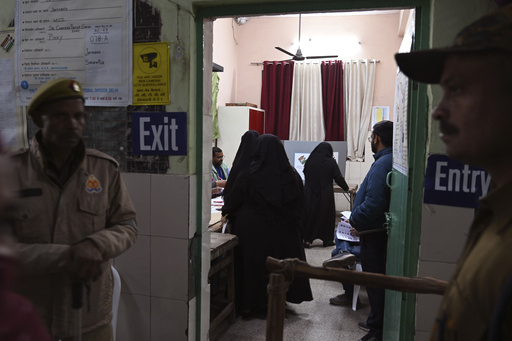
NEW DELHI — On a chilly day in the Indian capital, thousands of residents participated in the state legislative elections on Wednesday, as Prime Minister Narendra Modi’s Bharatiya Janata Party (BJP) aimed to topple the long-standing ruling party, the Aam Aadmi Party (AAP). This election is particularly significant, as the AAP has governed New Delhi for more than a decade.
Polling was held at various locations throughout the vast metropolis, with voters braving the winter weather to make their choices known. Key figures in the AAP, including Manish Sisodia, engaged in spiritual rituals at a temple before heading to the polls, highlighting the cultural significance of the event.
The contest is primarily between the BJP, led by Modi, and the AAP, spearheaded by Arvind Kejriwal. The AAP has established a strong support system through its focus on welfare initiatives and a robust anti-corruption campaign. However, Kejriwal has recently faced scrutiny amid allegations of corruption that have questioned his reputation as a reformist leader.
In the previous state elections held in 2020, the AAP claimed an overwhelming victory, securing 62 out of 70 seats, while the BJP managed to win only eight, with the Congress party failing to win any. The AAP had previously experienced a similar success in the 2015 elections, where it won 67 seats compared to the BJP’s three.
Both Modi and Kejriwal have actively campaigned, drawing large crowds during public roadshows. They have promised improvements in government schools, as well as free healthcare and electricity, and even proposed a monthly stipend for impoverished women.
The voting concluded on Wednesday, with the results set to be announced on Saturday. Over 15 million residents of New Delhi are eligible to cast their votes in this pivotal election.
Political analyst Arati Jerath indicated that the competition between the AAP and BJP appears to be close this time around, especially since the AAP’s rise has typically rendered the elections one-sided in favor of the ruling party.
New Delhi, home to over 20 million people, is a federal territory where the BJP has not gained control in more than 27 years, despite having a significant following within the city.
Kejriwal and other leaders of the AAP recently faced a slew of accusations concerning corruption linked to a liquor licensing scandal. Neerja Chowdhury, another observer, noted that the implications of this case had tarnished Kejriwal’s image, which he had built as a leader committed to transparency and ethical governance.
Last year, Kejriwal and two senior colleagues from his party were detained on the grounds of receiving bribes connected to the liquor distribution sector. They have persistently denied these allegations, asserting that they are being targeted due to political rivalries. The Supreme Court later granted their release on bail.
Following these events, Kejriwal stepped down from his position as chief minister, handing the role to another prominent party member.
Although the BJP did not secure a majority independently in the last national election, it has regained some influence, winning state elections in northern Haryana and western Maharashtra. Modi’s party anticipates that the recent federal budget adjustments, which reduced income tax for salaried citizens—an essential voting demographic—will further bolster its chances.
Opposition parties have expressed outrage over Kejriwal’s arrest, alleging that the central government is misusing investigative agencies to undermine political adversaries. They have pointed to numerous raids and investigations targeting key opposition members in the lead-up to national elections as further evidence of this alleged misuse of power.
Having established the AAP in 2012 as an outlet of public discontent against the Congress party’s governmental corruption, Kejriwal has laid emphasis on policies that directly assist the underprivileged. Initiatives include improving state-operated educational institutions, offering subsidized electricity, free healthcare, and transportation for women.
The BJP lost its grip on governance in Delhi to the Congress party in 1998, which subsequently held power for 15 years before the AAP’s sweeping victories in both 2015 and 2020 elections.

